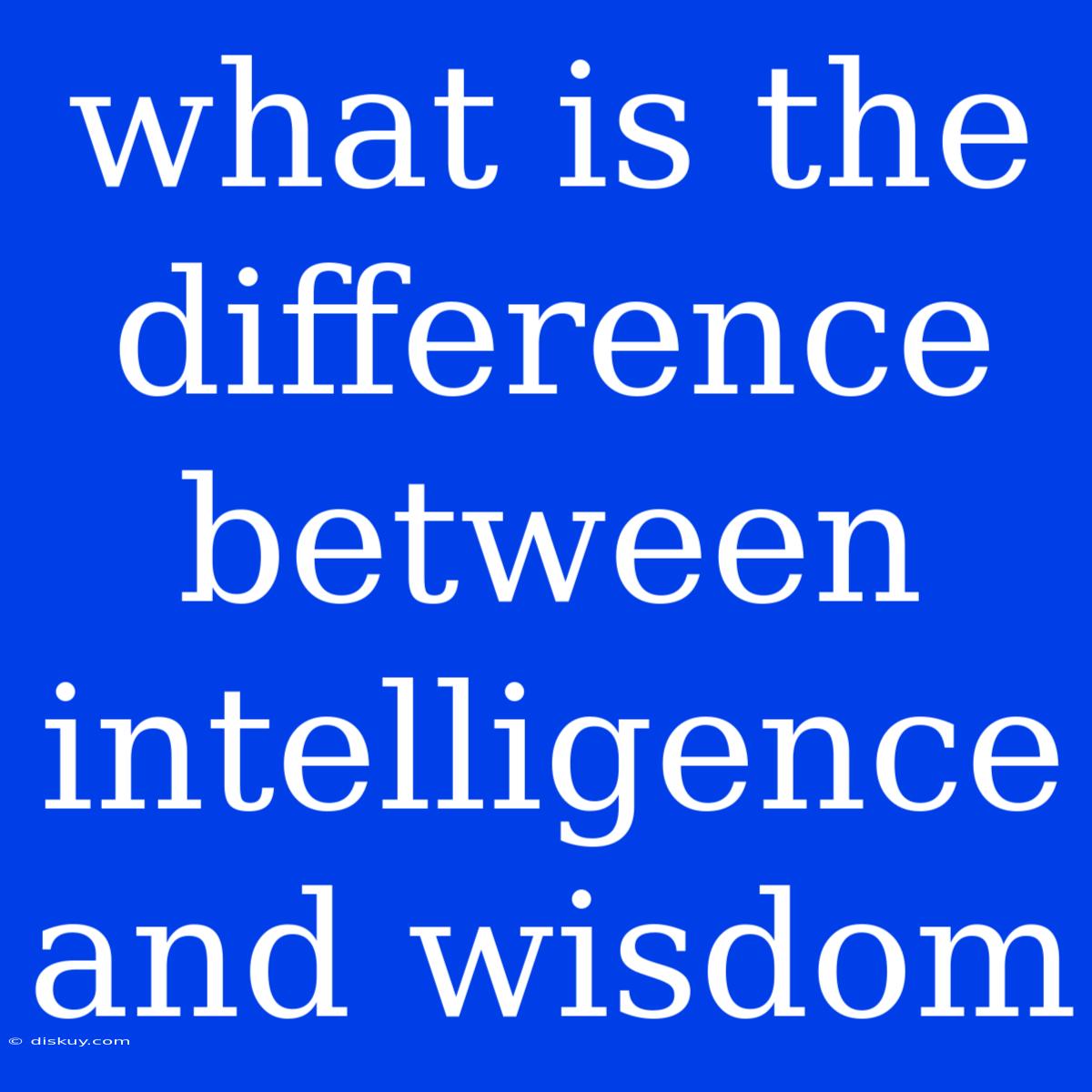What's the Difference Between Intelligence and Wisdom: Unveiling the Key to True Understanding
Is intelligence the same as wisdom? This is a question that has been pondered for centuries, and the answer is a resounding no. While often used interchangeably, intelligence and wisdom are distinct concepts, each playing a vital role in shaping our understanding of the world and our place within it.
Editor Note: Exploring the difference between intelligence and wisdom is crucial for personal growth and navigating life's complexities. Understanding these concepts can help us make informed decisions, build stronger relationships, and ultimately, lead more fulfilling lives.
Importance of Understanding the Difference:
This article delves into the nuances of intelligence and wisdom, revealing their unique characteristics and demonstrating why grasping their distinction is essential. We'll examine these concepts through the lens of various perspectives, including cognitive psychology, philosophy, and practical application in everyday life.
Analysis:
To gain a comprehensive understanding of the difference between intelligence and wisdom, we conducted extensive research, analyzing multiple definitions, examining the work of renowned thinkers, and studying real-world examples. This exploration allowed us to identify key characteristics of each concept and develop a clear framework for comparison.
Key takeaways of Intelligence and Wisdom:
| Feature | Intelligence | Wisdom |
|---|---|---|
| Definition | Cognitive ability to learn and apply knowledge | Ability to apply knowledge and understanding to real-life situations, often with ethical and moral considerations |
| Focus | Information acquisition and processing | Understanding the meaning and implications of information |
| Development | Learned through education and experience | Cultivated through introspection, reflection, and life experiences |
| Application | Solving problems, understanding complex concepts | Making wise decisions, guiding actions, navigating life's complexities |
| Outcomes | Knowledge, skills, and problem-solving abilities | Sound judgment, ethical conduct, and personal growth |
Intelligence and Wisdom: A Deeper Dive:
Intelligence: The Building Blocks of Knowledge
Intelligence is the ability to acquire and process information, solve problems, and learn from experiences. It encompasses various cognitive abilities, such as:
- Logical reasoning: Analyzing information and drawing logical conclusions.
- Verbal comprehension: Understanding and expressing language effectively.
- Spatial reasoning: Manipulating and visualizing objects in space.
- Mathematical ability: Solving numerical problems and understanding mathematical concepts.
- Memory: Remembering and retrieving information.
Facets of Intelligence:
- Types: Intelligence can be categorized into different types, such as fluid intelligence (adapting to new situations) and crystallized intelligence (accumulated knowledge).
- Measurement: Standardized tests are often used to measure intelligence, but they only reflect a limited aspect of cognitive ability.
- Development: Intelligence can be developed through education, practice, and continuous learning.
Wisdom: The Application of Knowledge to Life
Wisdom goes beyond simply possessing knowledge. It involves understanding the meaning and implications of that knowledge, using it to navigate life's complexities, and making decisions that align with ethical and moral principles.
Facets of Wisdom:
- Self-awareness: Understanding one's own strengths, weaknesses, and biases.
- Emotional intelligence: Recognizing and managing emotions effectively.
- Perspective: Considering multiple viewpoints and understanding different perspectives.
- Empathy: Understanding and sharing the feelings of others.
- Ethical decision-making: Choosing actions aligned with moral principles and values.
The Relationship Between Intelligence and Wisdom:
Intelligence provides the foundation for wisdom. It equips us with the cognitive tools to learn, understand, and solve problems. However, wisdom requires more than just intelligence; it involves using knowledge ethically and effectively to make sound judgments and navigate life's complexities.
FAQ: Intelligence and Wisdom
Q: Can someone be intelligent but not wise?
A: Yes. Intelligence and wisdom are distinct. Someone with high intelligence might excel in academics but lack emotional intelligence or the ability to apply their knowledge ethically.
Q: How can I develop wisdom?
A: Wisdom is cultivated through continuous learning, reflection, and life experiences. Seek out mentors, engage in meaningful conversations, and consider different perspectives.
Q: Is wisdom more important than intelligence?
**A: ** Wisdom is often considered more valuable than intelligence, as it allows us to use our knowledge for good and make sound decisions in the face of life's challenges.
Tips for Developing Wisdom:
- Seek out diverse perspectives: Engage with people from different backgrounds and beliefs.
- Reflect on your experiences: Learn from your successes and failures.
- Practice empathy: Put yourself in others' shoes to understand their perspectives.
- Make ethical decisions: Consider the consequences of your actions and choose to act with integrity.
- Embrace humility: Acknowledge that you don't know everything and are open to learning.
Summary of Intelligence and Wisdom:
Intelligence and wisdom are distinct but interconnected concepts. Intelligence focuses on acquiring and processing information, while wisdom emphasizes applying knowledge ethically and effectively to navigate life's complexities. Cultivating both intelligence and wisdom is essential for personal growth, well-being, and fulfilling lives.
Closing Message:
While intelligence helps us understand the world, it is wisdom that guides our actions and shapes our understanding of what truly matters. By embracing the pursuit of wisdom, we can make informed decisions, navigate challenges with greater clarity, and live lives aligned with our values.

